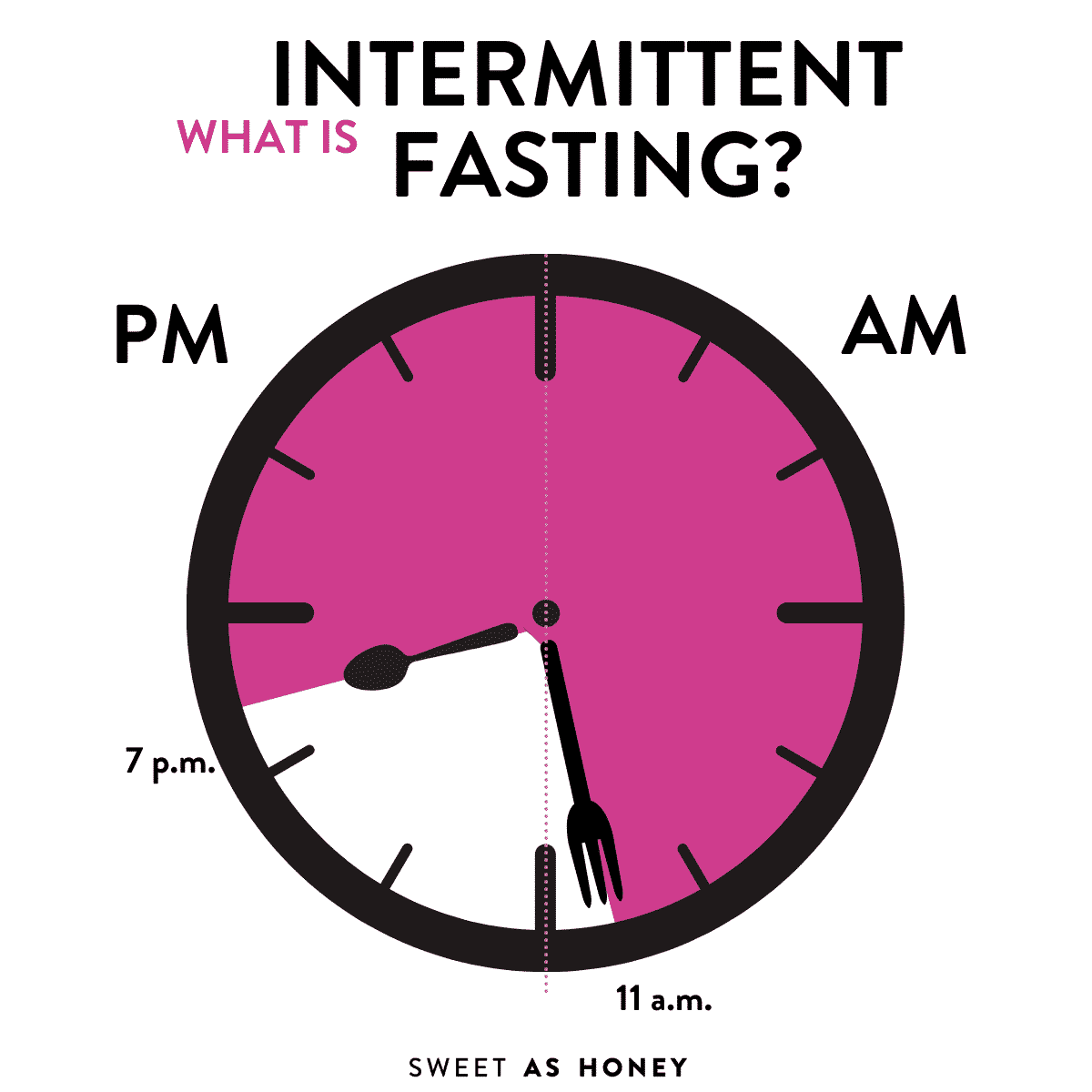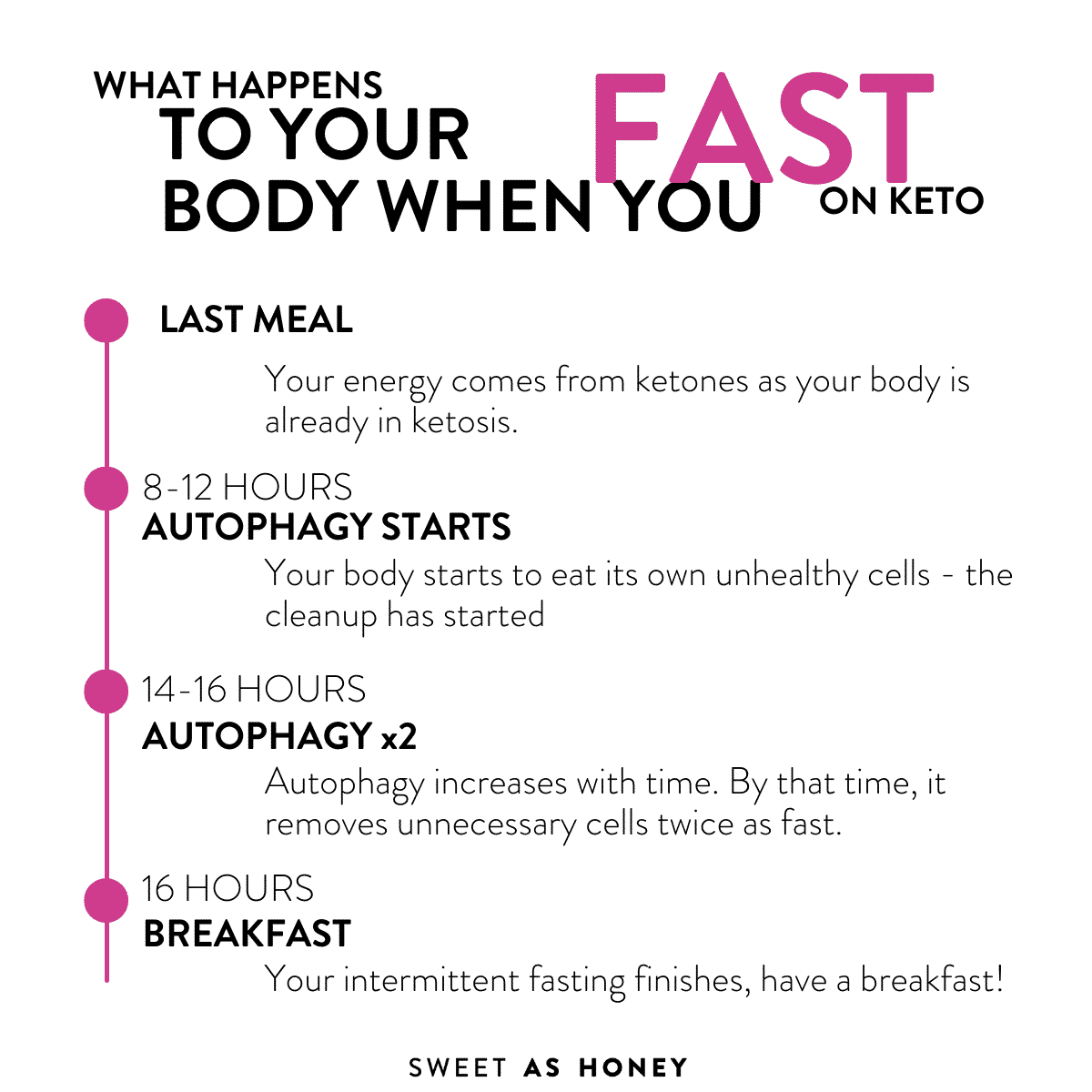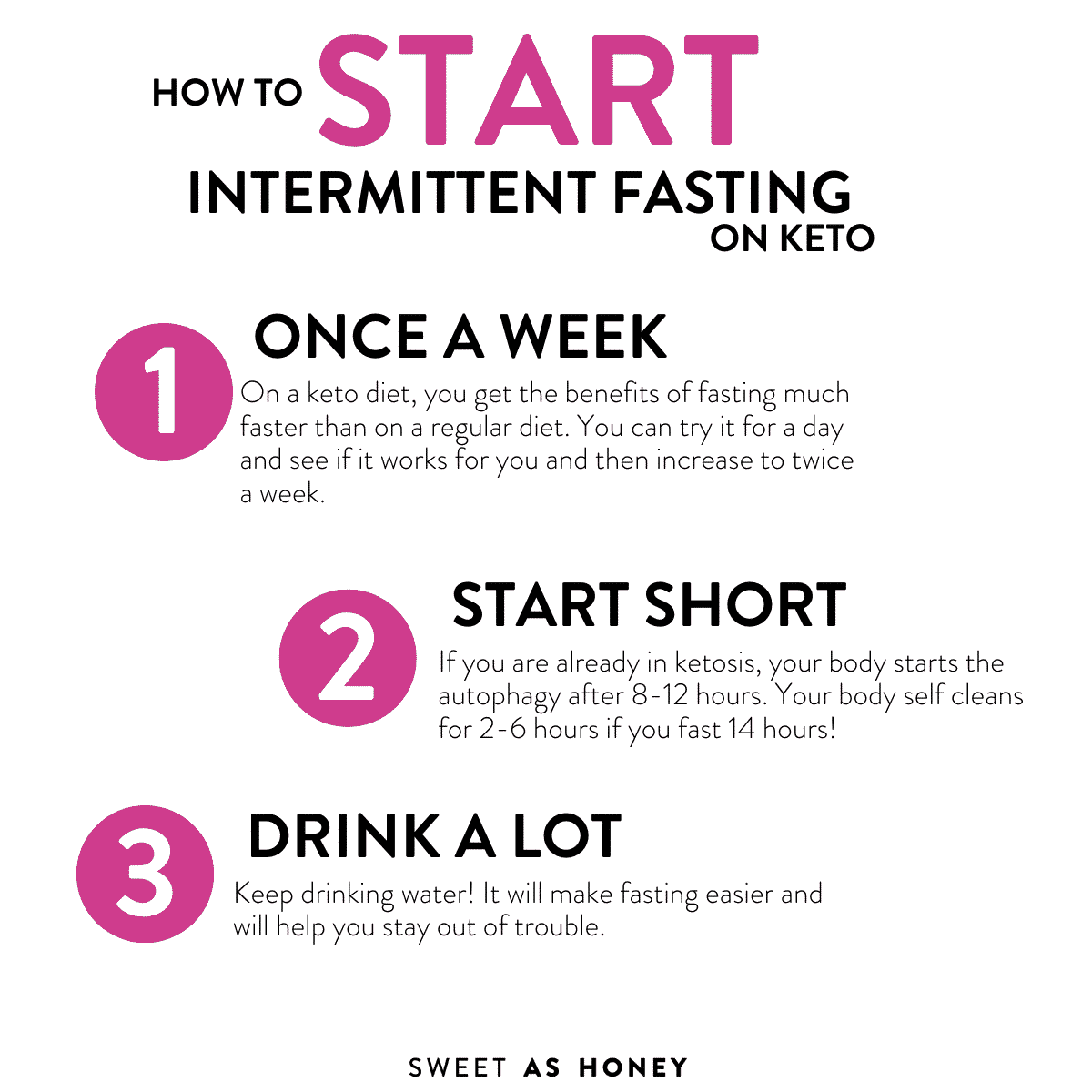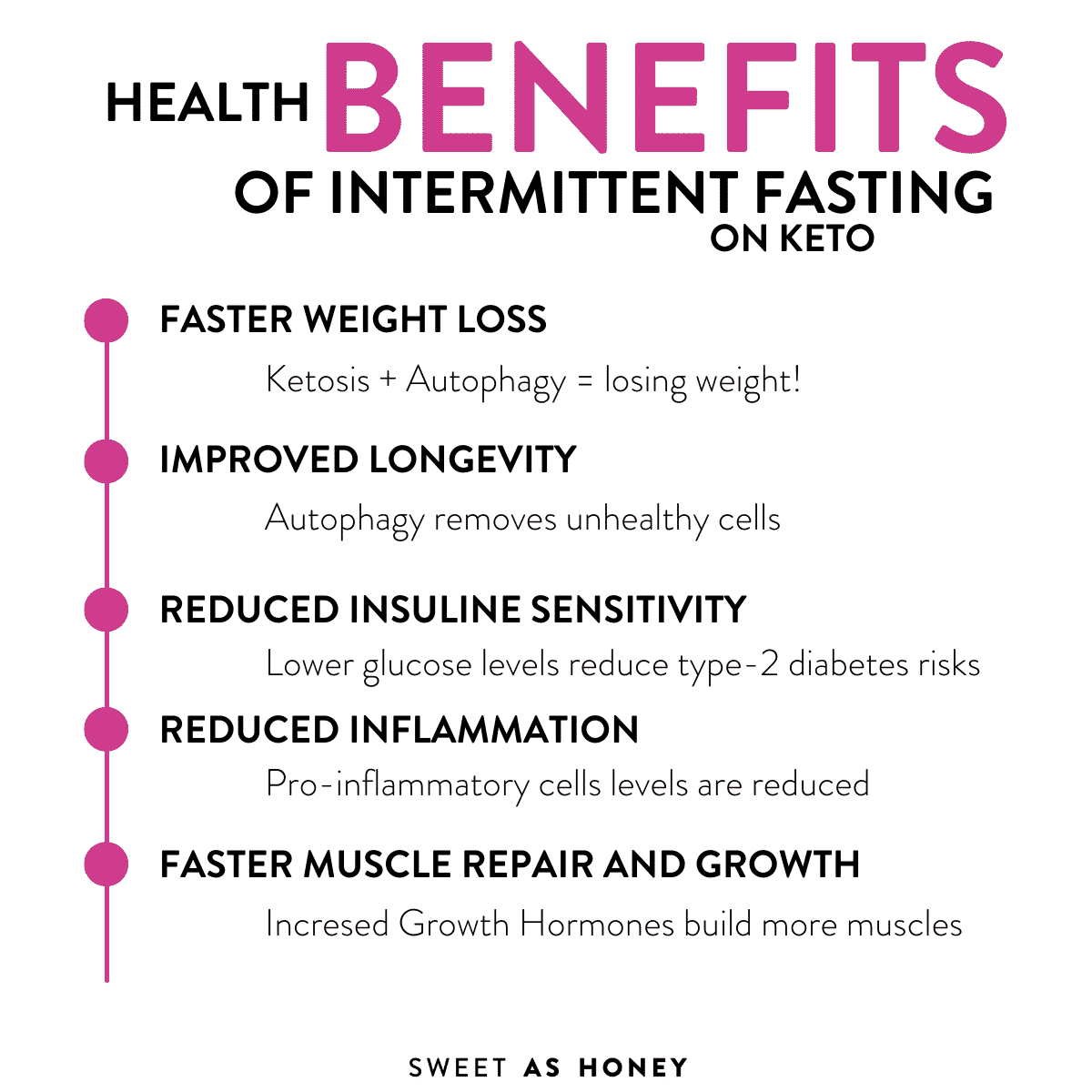Keto Fast – The Quick Way to Ketosis
This recipe may contain Amazon or other affiliate links. As an Amazon Associate I earn from qualifying purchases.
Fasting or Intermittent Fasting is often associated with weight loss, in particular for people on a keto diet. The Keto Fast (IF for Intermittent Fasting) is very popular around the world and has been associated with weight loss and positive health effects.
What is Intermittent Fasting?
Intermittent Fasting – also called Time-Restricted Fasting – is a popular method of eating on the keto diet that consists of restricting your eating window over a shorter period.

Though Intermittent Fasting is often associated with the Keto Diet, it does not have to be. Many people also find it beneficial while following a regular diet.
The most popular and efficient Keto Fast patterns are:
- 16/8: which consists of 16 hours of fast and spreading the meals over the remaining 8 hours.
- 14/10: which consists of 14 hours of fast and leaves 10 hours to eat.
Fasting is actually much more common than you might think. In fact, breakfast literally means “breaking the fast”.
The principle of Intermittent Fasting is to increase the duration of this overnight fast to boost its benefits.
IF has often been seen as a way to go beyond the Keto Plateau – a time where your body has shed as much weight as it can on a regular keto diet.
What happens to your body when you fast?
Fasting has quite different effects depending on whether you are already following a keto diet.

If you are not on a keto diet
For someone not on the keto diet, fasting pushes their body to use an alternative to glucose to maintain its metabolism
Three to four hours after the last meal, blood sugar levels go back to their pre-meal levels.
The body still has enough glucose available – in the blood, in the liver, and in other glycogen stores – to function normally for up to 12 hours.
After 12 hours, all readily accessible glucose stores are empty, the body goes into ketosis, turning fat into ketones used by our cells – which is the principle behind the keto diet.
After 24 hours, your body will be in battery-saving mode. It will function more slowly, and it will begin an autophagy state – a self-cleaning mode.
In autophagy (which comes from Ancient Greek and means self-devouring), the body removes unnecessary cells by eating them.
Though it sounds somewhat scary, autophagy is considered a cleaning mechanism as the body starts with all the unhealthy, unnecessary cells.
Autophagy is not linear. It starts slow and keeps increasing for as long as you fast. It reaches its peak 3 days after starting the fast.
There are other physiological changes when the body is fasting:
- Growth Hormone Levels increase
- Insulin levels plummet
- Cells repair is in full swing
- Immunity and Longevity genes are activated
If you are already on a keto diet
The keto diet, in particular, if you are in ketosis when fasting, gives a 12 to 24-hours head start in the fasting process.
As result, the Autophagy state that cleans your body begins after about 8-12 hours – instead of 24 hours on a non-keto diet.
This means that on a keto diet, you can get the benefits of a fast every day. That would be impossible on a regular diet as the autophagy state begins after 24 hours!
Can fasting help with ketosis?
When the body fasts for long enough, it goes into ketosis – it is a natural process that turns fat into ketones that can be used by our cells as a source of energy.
If you are already in ketosis when starting the fast, you will get many of the fasting benefits much faster, in particular those linked to autophagy.
If you were not in ketosis when starting the fast, fasting will help you get there! It takes about 12 hours of fasting for the body to go into ketosis.
This time of course depends on the levels of glucose storage in your blood, liver, and muscles. So it could be slightly shorter or longer.
Should I do Keto Intermittent Fasting?
Intermittent Fasting has clear, documented health benefits. However, it puts the body in a form of stress so it is not recommended for everyone.
Keep in mind that the keto diet can be hard on the body so it is essential to check with your doctor before starting!
If you are new to the keto diet, starting with Intermittent Fasting immediately is not recommended.
It’s is much better and easier to first start and learn about the keto diet, and then once your body has adapted to its new normal, implement intermittent fasting.
1. Start with keto
The Keto Diet is all about reducing our carbohydrate intake in order to put the body in ketosis.
Ketosis is a mode where our body burns fat and therefore can help with weight loss.
Starting on a keto diet before implementing Intermittent Fasting helps your body adapt. It takes a few weeks for your bacterial guts and system to evolve from metabolizing high-carb food to being served only low-carb food.
It’s also important to consider the mental aspect of the change. Keto is a restrictive diet, and if others around you aren’t supportive, you need some time to build resilience. Adding Intermittent Fasting at the same time can be taxing on the mind.
2. Introduce Intermittent Fasting
Once you are used to the keto diet, know what you can eat, and you have found your favorite keto recipes, implementing Intermittent Fasting can help you go beyond the keto plateau.
How to introduce Intermittent Fasting
To introduce Intermittent Fasting on a Keto diet, go slow!
Because Intermittent Fasting provides immediate daily benefits if you are already in ketosis, you don’t have to go all out.

How many days should I fast?
You can perfectly start introducing Intermittent Fasting one or two days a week.
Then, as you learn more about your body increase that to three or four days a week.
And if you feel good and strong, and get the benefits you were looking for, go for a full week!
Some people are on a continual intermittent fasting schedule and that has become their new normal.
For some, Intermittent Fasting is a way to reset for a week every now and then.
How long should I fast?
If you are on a keto diet, and you are in ketosis already, the autophagy phase that provides the health benefits from Intermittent Fasting starts after a minimum of 8 to 12 hours.
Since autophagy itself is far from instantaneous, you have to remain in a fast for a few hours to get its benefits.
Keep in mind that autophagy gets stronger the longer you fast. So doubling the time your body is in this mode almost multiplies its cleaning strength by 4.
That’s why the typical recommendation is to fast for 16 hours and concentrate the meals on the remaining 8 hours.
On a 16/8 fast, you would for example have your last meal at 7 p.m. and wait until 11 a.m. the next day to have your breakfast (to break your fast).
However, if that is too long for you, fasting for 14 hours is enough to get you some of the self-cleaning.
On a 14/10 fast, if you had your last meal at 7 p.m., you would take your breakfast at 9 a.m. the following day.
Stay Hydrated
The body dehydrates quicker during a fast, partly because eating most food also brings a marginal quantity of water.
Therefore, it is crucial to keep drinking water while fasting.
Water is not fast-impacting.
If you’re struggling to drink sufficient liquids, you can try my keto-friendly Chia Fresca with an additional Ginger Shot.
What are the health benefits of fasting?
Fasting has two main benefits. First, it may help your weight loss as it keeps your body in ketosis for longer.
Then, because fasting puts your body in autophagy, it may also improve your general health by removing unhealthy cells.

Might help lose weight faster
If you are already on a keto diet, Intermittent Fasting may boost your weight loss.
Many people report an increase in weight loss after implementing IF.
Since the body stays in strict ketosis for 16 hours, it is in full fat-burning mode.
On top of that, autophagy removes all the unhealthy and unnecessary cells from your body, at a rate that increases with the duration of the fast.
This boosts weight loss even more!
Might help general health
There are many documented health benefits to intermittent fasting, regardless of the diet.
Improved Immunity and Longevity
Fasting has been linked to a reduced risk of cancer (source, source, source), and improved brain aging (source).
It has also increased the life span of rats in medical studies by up to 83% (source)!
Reduced Insulin Sensitivity
Fasting reduces insulin levels, which in turn protects against type-2 diabetes (source).
Muscle repair and growth
During the day or while exercising, muscles are damaged. They need a period of rest to rebuild. Fasting helps rebuild muscles faster (source).
The increase in Human Growth Hormone due to fasting also helps build additional muscle (source).
Reduced inflammation
Intermittent fasting reduces the release of pro-inflammatory cells (Moncytes) leading to reduced inflammation and to improved chronic inflammatory diseases.
Are there risks with Intermittent Fasting on a Keto diet?
Despite having proven positive outcomes, Intermittent Fasting is not for everyone on a keto diet.
It has some possible side effects to look out for:
- Feeling sick: with headaches, lethargy, constipation. The changes in the physiological rhythm can affect several body functions.
- Causing over-eating: after a fasting period, the body is pushing the brain to over-eat to compensate and prepare for a potential re-run. So be prepared for a larger-than-usual appetite in the first few days.
- Losing too much weight too fast: Intermittent Fasting and Keto are a very efficient combination, and losing weight too fast can be harmful to the body. Make sure to talk to your doctor!
- Irritability: Low blood sugar levels have been long linked with potential mood swings. Adding to that a fasting period has been seen to increase irritability in control trials.
- Dehydration: Fasting means not eating for a period. It does not mean not drinking water! Many people wrongly assume they should not drink water while it is actually advised to drink more when you fast!
Some of these symptoms are also associated with the keto flu. Read my article on the Keto Flu Symptoms and Remedies.
Conclusion
Intermittent Fasting is a well-documented way to boost weight loss while providing other benefits.
It is not necessarily for everyone, and it is not recommended when starting the keto diet, but it is one of the most effective tools to go beyond the keto plateau.
Posted In:
Category:
ArticlesDisclaimer
The recipes, instructions, and articles on this website should not be taken or used as medical advice. The nutritional data provided on Sweetashoney is to be used as indicative only. The nutrition data is calculated using WP Recipe Maker. Net Carbs is calculated by removing the fiber and some sweeteners from the total Carbohydrates.
You should always calculate the nutritional data yourself instead of relying on Sweetashoney's data. Sweetashoney and its recipes and articles are not intended to cure, prevent, diagnose, or treat any disease. Sweetashoney cannot be liable for adverse reactions or any other outcome resulting from the use of recipes or advice found on the Website.

Share this post!
If you enjoyed this post, share it with your close ones!
Leave a comment
I was looking for different ways to break a prolonged water fast?
I know the types of food that digests better etc, I was wondering if you have a specific list somewhere (I am a new member).
Thank you
Jess
I don’t have any list in particular, I tend to choose something easy on the stomach to start with!
Very informative. Thanks
Awesome article! Shared it with my brother who is a weight lifter and knows a lot , but I liked the way this is outlined .. I’m sure he’ll appreciate the at articles
Thanks Carine !
Thank you !